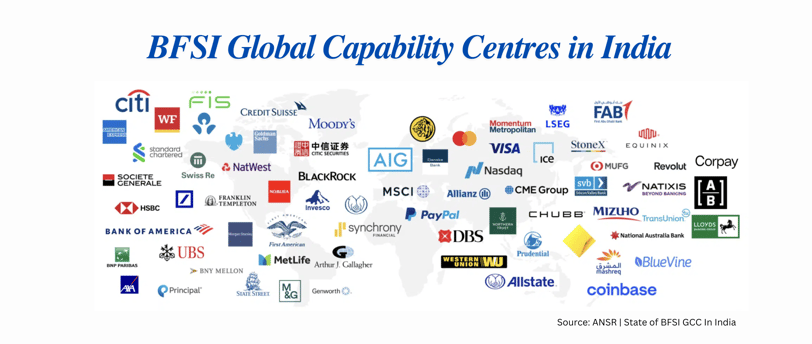Rising Opportunities: The Growth of BFSI Sector Global Capability Centres in India's
Partha Anand
2/1/20252 min read


India is rapidly establishing itself as a global hub for Global Capability Centres (GCCs), particularly in the Banking, Financial Services, and Insurance (BFSI) sector. With over 1,700 GCCs currently operating in the country and projections indicating growth to approximately 2,100 by 2030, this trend presents significant opportunities for graduates across various fields. As these centres expand their operations, they are creating a wealth of job openings that encompass technology, analytics, and management functions.
Prominent GCCs in India
Several prominent GCCs are leading the charge in this sector. For instance:
JP Morgan Chase & Co.: Based in Bengaluru, this centre employs over 10,000 professionals and focuses on investment banking and risk management.
HSBC: With locations in both Bengaluru and Hyderabad, HSBC has a significant workforce dedicated to technology and financial operations.
Bank of America: Located in Hyderabad, it employs around 8,000 individuals and specializes in global banking solutions.
American Express: This company operates a large GCC in Gurgaon with approximately 5,000 employees focusing on customer service and technology solutions.
Standard Chartered: Based in Mumbai, this centre has over 7,000 employees working on various banking services.
According to ANSR Research, about 20-25% of all GCC employees in India work within the BFSI sector. The demand for skilled professionals escalates as GCCs evolve from cost-driven back-office operations to strategic hubs that drive innovation and high-value capabilities.
Opportunities for Graduates
The expansion of GCCs offers myriad job opportunities for graduates from diverse educational backgrounds. Roles in data analytics, risk management, customer service, and technology are particularly in demand. Graduates can enrol and obtain certifications from BFSI Sector Skill Council (SSC) approved institutes to become eligible for placement assistance in these companies. This structured training ensures that candidates are well-prepared to meet the industry's evolving demands.
Moreover, the Indian government is actively promoting the establishment of GCCs in tier-2 and tier-3 cities, which is likely to further increase job opportunities outside major metropolitan areas. This decentralization not only helps address local employment challenges but also encourages reverse migration trends witnessed during the pandemic.
The strategic significance of GCCs in India cannot be overstated. They contribute substantially to the country's GDP and are becoming pivotal in attracting foreign investment. As per estimates, GCCs generate close to $64 billion in business annually. Furthermore, around 80% of the Fortune Global 2000 companies have yet to establish a presence in India, indicating vast untapped potential for job creation.
In conclusion, as the landscape of Global Capability Centres continues to evolve within India's BFSI sector and beyond, graduates have a unique opportunity to leverage this growth. By pursuing relevant skills and training through BFSI SSC approved institutes, they can position themselves advantageously in a market that is ripe with potential. With ongoing government support and a favorable business environment, the future looks promising for aspiring professionals entering this dynamic field.
Legal Notice | Terms & Conditions | Cookie Policies
© 2024. Bankerly Enterprise Learning Private Limited


DPIIT Regn No. DIPP55873
